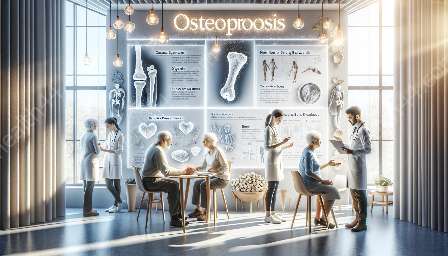Osteoporosis is a health condition characterized by weakened bones, making them fragile and more prone to fractures. It often develops silently and progresses without visible symptoms until a fracture occurs. However, nutrition can play a crucial role in managing and preventing osteoporosis.
Understanding Osteoporosis
Osteoporosis is a common condition, particularly among older adults, but it can also affect younger individuals. The bones become porous and brittle, increasing the risk of fractures, especially in the hip, spine, and wrist. While osteoporosis can be influenced by genetic factors, certain lifestyle choices and nutritional deficiencies can also contribute to its development.
Key Nutrients for Bone Health
To support healthy bones and reduce the risk of osteoporosis, it's essential to obtain key nutrients from the diet. These include:
- Calcium: The primary mineral essential for bone health, calcium contributes to bone strength and density. Good food sources of calcium include dairy products, leafy green vegetables, and fortified foods.
- Vitamin D: Vitamin D plays a crucial role in calcium absorption and utilization, making it vital for maintaining strong bones. Sun exposure and dietary sources such as fatty fish and fortified foods can help maintain adequate vitamin D levels.
- Protein: Protein is necessary for bone structure and strength. Consuming adequate protein from sources like lean meats, poultry, fish, legumes, and dairy products can support bone health.
- Magnesium: Magnesium is involved in bone formation and supports the structural development of bones. It can be found in foods such as nuts, seeds, whole grains, and leafy green vegetables.
- Vitamin K: Vitamin K aids in bone mineralization and supports the modification of bone proteins. Good sources of vitamin K include leafy green vegetables, broccoli, and fermented dairy products.
- Phosphorus: Phosphorus works with calcium to support bone structure and strength. It is present in a variety of foods, including dairy products, meat, and whole grains.
Dietary Guidelines for Osteoporosis
When addressing osteoporosis through nutrition, it's important to focus on a balanced diet that incorporates the essential nutrients for bone health. Additionally, the following dietary guidelines can help in managing and preventing osteoporosis:
- Calcium-Rich Foods: Incorporate dairy products, such as milk, cheese, and yogurt, into your diet. Alternatively, choose calcium-fortified plant-based milks and other fortified foods.
- Vitamin D Sources: Consume foods rich in vitamin D, including fatty fish like salmon and mackerel, egg yolks, and fortified products.
- Protein Intake: Include adequate protein from a variety of sources, such as lean meats, poultry, fish, legumes, and low-fat dairy products.
- Healthy Fats: Choose sources of healthy fats, including nuts, seeds, avocados, and olive oil, to support overall bone and heart health.
- Fruits and Vegetables: Incorporate a variety of fruits and vegetables into your diet to provide essential vitamins, minerals, and antioxidants that support overall health, including bone health.
- Limit Sodium and Caffeine: Excess consumption of sodium and caffeine can contribute to bone loss, so it's advisable to limit intake from sources such as processed foods and caffeinated beverages.
- Limit Alcohol: Excessive alcohol consumption can negatively affect bone health, so it's important to moderate alcoholic beverage intake.
Supplements for Osteoporosis
In some cases, individuals may need to consider supplements to ensure they are obtaining adequate nutrients for bone health. It's important to consult with a healthcare professional before starting any supplements, but common options may include:
- Calcium and Vitamin D: For those who struggle to meet their calcium and vitamin D needs through diet alone, supplements may be recommended to bridge the gap.
- Multi-Nutrient Formulas: Some individuals may benefit from a comprehensive bone health supplement that combines calcium, vitamin D, magnesium, and other essential nutrients.
- Vitamin K2: Supplementing with vitamin K2 may be beneficial for some individuals, especially those with specific dietary restrictions or risks for vitamin K deficiency.
Lifestyle Factors and Osteoporosis
In addition to nutrition, certain lifestyle factors play a crucial role in the management and prevention of osteoporosis. Regular weight-bearing exercises, such as walking, dancing, and resistance training, can help promote bone strength and density. Avoiding smoking and excessive alcohol intake is also important, as these habits can contribute to bone loss and weaken overall bone health.
Conclusion
Nutrition is a fundamental aspect of managing and preventing osteoporosis. By incorporating a well-rounded diet rich in essential nutrients, individuals can support their bone health and reduce the risk of fractures associated with osteoporosis. Combined with a healthy lifestyle that includes regular physical activity and the avoidance of detrimental habits, a holistic approach to bone health can be established, improving overall well-being and quality of life.


